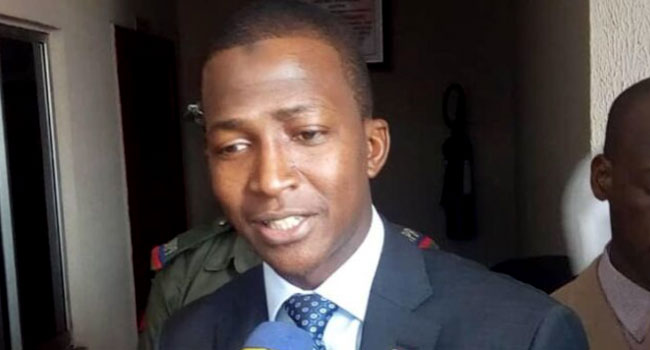President Muhammadu Buhari has asked the Senate to confirm Mr Abdulrasheed Bawa as substantive Chairman of the Economic and Financial Crimes Commission (EFCC).
This was disclosed in a statement written on Tuesday by the Special Adviser to the President on Media and Publicity, Femi Adesina.
In a letter to the President of the Senate, Ahmad Ibrahim Lawan, the President said he was acting in accordance with Paragraph 2(3) of Part1, CAP E1 of EFCC Act 2004.
The statement added that 40-year-old Bawa is “a trained EFCC investigator with vast experience in the investigation and prosecution of Advance Fee Fraud cases, official corruption, bank fraud, money laundering, and other economic crimes.”
He is said to have undergone several specialised trainings in different parts of the world, and was one of the pioneer EFCC Cadet Officers in 2005.
Bawa holds a B.Sc degree in Economics, and Masters in International Affairs and Diplomacy.
He will be taking over from Mohammed Umar, who has been in acting capacity since July 2020 after the suspension of Ibrahim Magu over allegations of gross misconduct.
Background
Abdulrasheed Bawa graduated from the Usmanu Danfodio University, Sokoto, with a Bachelor of Science degree in Economics (Second Class Upper) in 2001.
Bawa, who joined the EFCC as an Assistant Detective Superintendent (ADS) in 2004, also holds a Master’s degree in International Affairs and Diplomacy which he obtained from the same university in 2012.
According to his CV, Bawa has spent 17 years working with the EFCC as a detective, and is currently pursuing a Bachelor of Laws degree at the University of London.
He was part of the pioneer EFCC Cadet Officers, course one, 2005.
He rose through the ranks to become a Deputy Chief Detective Superindent (DCDS), a position he has been holding since 2016 up till the time of his nomination as the anti-graft agency’s substantive chairman.
He has vast investigation experience and has been part of the prosecution of advance fee fraud, official corruption, bank fraud, money laundering and other economic and financial crimes related offences.



